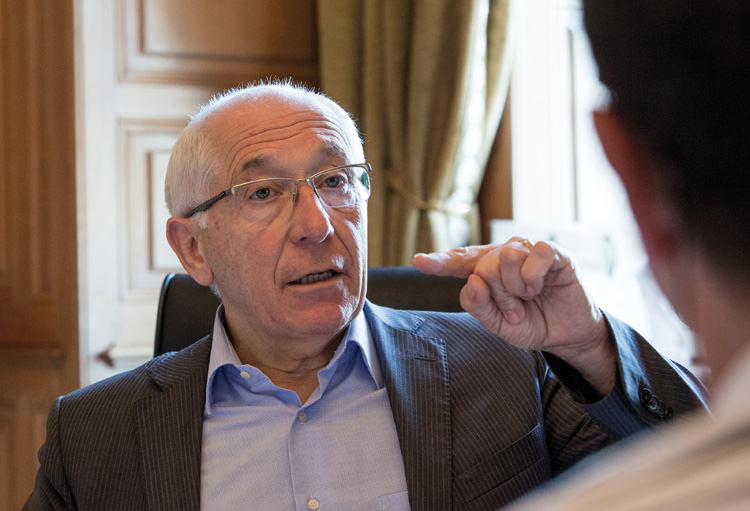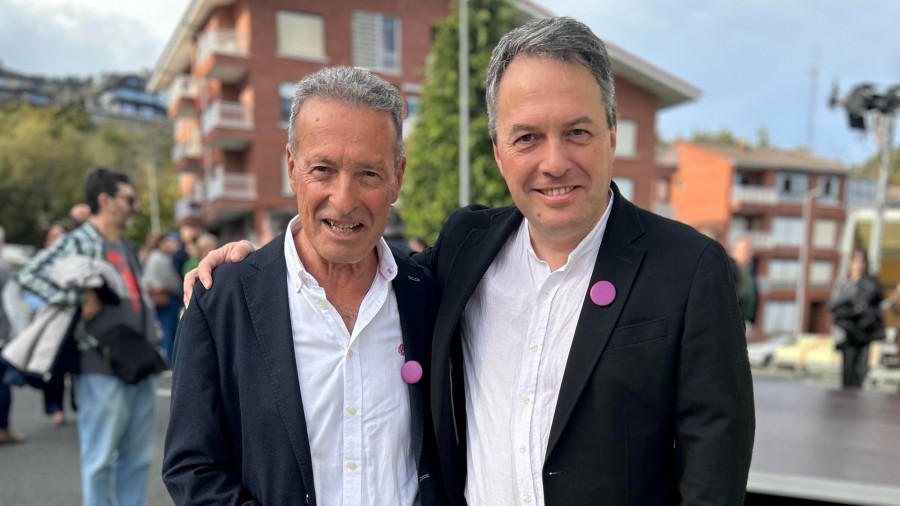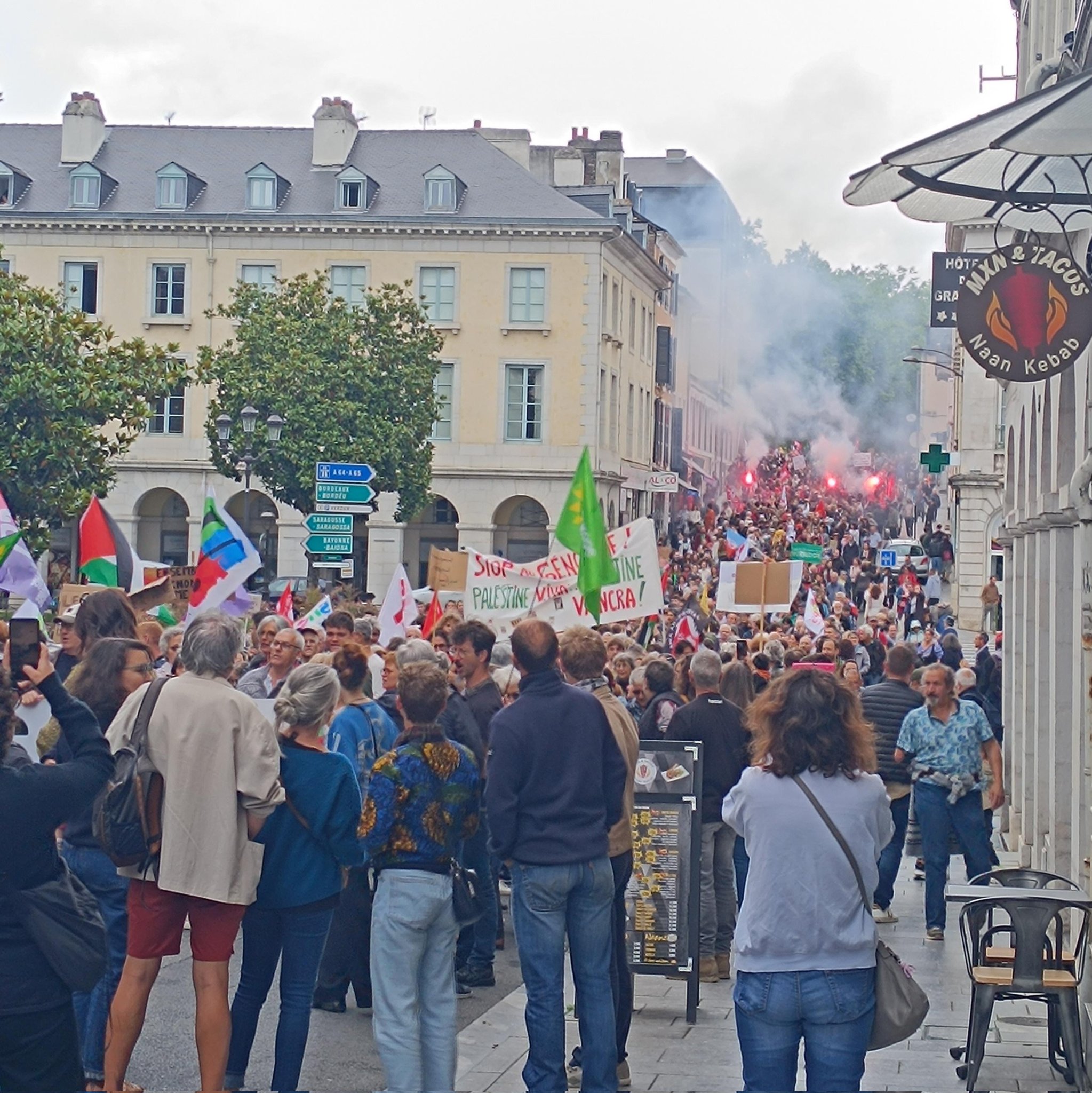"Courts cannot decide for the democratic people"
- Beskoitze 1952. Attorney. Centrist. Member of the UDI (Union of Independent Democrats). Mayor of Baiona since 2014. Elected from the Casa Consistorial since 1995. President of the Council of Elects of the Basque Country. Prior to the interview, a group of voters had filed a hierarchical appeal against the Public Institution for Local Cooperation (HELEP/Herri Elkargoa). Having greeted Jean-René Etchegaray, we learned that 60 elects have appealed to the courts: “The courts cannot decide for the democratic people,” the mayor told us in the interview.

Barthelemy Aguer of Lüküz and Lucien Delgue of Armendariz have submitted a hierarchical appeal against the project of the Commonwealth of Municipalities of Bizkaia.
I have not agreed to this hierarchical appeal. I know he has arrived at the Ministry of the Interior in Paris. I do not know his capacity or the name of the signatories. I was not surprised that Barthelemy Agüer and Lucien Delgue had resorted to the judgment, but I was not surprised. Agüer had already made the proposal in the Inter-Peoples Commission of the Department, with the objective of integrating two peoples of the Basque Country and Bearn into a single group. Your proposal is a bit iconoclastic. The proposal was ignored by the Department ' s Commission. The promoters of the appeal want political decisions to be taken by the courts rather than by the citizens, but the courts cannot decide instead of the democratic people. As a lawyer, the one I have worked in law for 37 years will not tell you that it is scandalous to play like this, I can say that those who do it are not doing any favours or giving any pleasure. The municipal councils have decided in a very important proportion: 73% of the electorate voted in favour [111 in favour of 158 municipalities and 47 against]. Supporters account for 66 per cent of the population. We supporters are in politics within the democratic system.
Can this resource be effective?
Hierarchical appeal is an administrative resource. The Administration may be the antecedent of the procedural cause. Legal arguments are needed to oppose the decisions of local councils, but in these cases the decision is not only legal, but also political. I am speaking to him now as a lawyer: those who oppose can use a lot of legal arguments, but so far I have not heard a fundamental political argument. I prefer them to be political arguments rather than legal arguments.
They say it's a way to make politics.
I too make politics. We all do politics, but there are forms and forms. I am not sorry to be against the project, because there is a possibility that it opposes the Public Institution for Local Cooperation (HELEP). However, the promoters of the appeal have to explain why they have done so now, when the French State has proposed for the first time to set up the institution of Herri Elkargoa, driven by the majority, after the yes majority. Why have you decided to go to court when this important decision has been taken? Your attitude is absolutely inadequate!
How can the prefect appeal?
The prefect is the representative of the State, he sees that the interests of the State are respected. It is responsible for institutionalising the Basque Country. The position of the electorate in our territory is within the framework of the law, our objective is that the country be as represented and organized as possible. The prefect has not imposed on us a ship or hard mold, has allowed us to create a single Commonwealth, and that form is within a given legal framework. We can create an institution according to our needs, because the mold is flexible, always adaptable to our possibilities. The prefect does not tell us what we should do.
“There are those on the French right, those on the left and the centrists in Herri Elkargoa’s project, but unfortunately, there are also Jacobins among us”
What is the first step forward?
The prefect has to decide in early June to order the merger of the existing public schools. We, until January 2017, have to work out the means to implement the HELEP and the single Community. We have a difficult technical and political work for six months. It is an inspection task. The convergence of public schools [are 10] will give rise to a new situation. The merger must reconcile the collegial competences: combining the functions of officials and financial means, including taxation and provisions. In order to prepare the first audit, the ten presidents of the current public schools are working on setting up an examining group, including myself, as chairman of the Council of Elects. Next, we must direct our analysis and make it available to a specialized and private cabinet, specialized in the merger of peoples. On the basis of the cabinet conclusions, we will take the fundamental decisions for the implementation of the project.
One of the problems is taxation, as there have been imbalances between urban centres and urban centres, among others. Harmonisation between large and small businesses seems difficult.
It is not true that taxation is a point of divergence, it has been very much discussed. Tax incidents can be regulated. Domestic, personal and private taxation will not be affected by the establishment of a single Public College. Corporate taxation will be applied in the light of the discussions between cities and peoples, sometimes it will be increases, but the increase in these tax offices or taxes will have a modest effect on companies. In addition, it will act flexibly, allowing taxation within twelve years to harmonise mutual imbalances. Work between the Municipal Councils will not raise tax problems. It may be a question of avatars on governance, because there are still issues that are being decided.
For example…
For example, the endowments or supplies that the State has to give to various mountain and field territories are very complex. The section is particular.
It is also important to strike a balance between the coast and the interior.
Yes, of course. However, the allocations to rural areas by the State will not be affected by the creation of a single Public College. For example, the arguments of Barthelemy Agüer and his friends are truly paradoxical. They say that in the new organization some areas of the interior will be losers, that the coast will devour the interior and, at the same time, claim that the peoples of the interior will dominate those of the sea, since more people and their representatives are more numerous. They have said everything and everything, even contradictory words. Indeed, the endowments received by rural areas, such as solidarity supplies or allocations for the promotion of the rural world, will not change the heritage of the owners and the succession of farms. These guarantees will be laid down in the measures being taken in the framework of the reform of the State.
“This reform does not respond to identity. This is a new initiative to organize the territories of the Republic and to create large interurban communities.”
Changes in transport have also been mentioned.
As regards transport, entry or state aid, it is subject to the rules on taxation of transport. In this respect, we have no definite answers, it is an unconsolidated point. The Government plans to draw up a new finance law next December. The State wants to apply a new law on entry into transport and on the standard rates applied in the sector. It appears that the rates of rural enterprises will differ from the rates of enterprises in the urban centre. It is an income similar to that of the areas with optimal transport for those who do not have transport or in the rural areas where the transport service is not insured. The State Administration is working on the harmonization of urban centres and rural areas.
We are moving from the Department to the Commonwealth. It seems that we are in a transitional period.
Transition is an exceptional time. We are living in a kind of institutional Big Bang in France. Large regions have just been formed and we are in one of them. It is the extension of Austria and its population to the level of Denmark. The two are European countries and states. If we are part of a region the size of these, think about it. It is essential to realize this, because the resources of the people are being reduced. The regions are growing and Inter-Village Colleges, like ours, are being created. Regions will take a great deal of weight. The department will soon become a structure of the past in France. Change is very important from a political and legal point of view, as the Department has lost the general competence clause, no longer responsible for tourism, the economy or transport. At the moment, it is only responsible for social issues.
Will it be the Public College that takes over these competences?
I had to. The houses of the people are crumbling more and more, they have no means. The new forms of engineering that are being created do not come, they do not dominate the intermediaries to start their competences. Therefore, the Public College must assume these powers, it is the only institution that guarantees it. Some say that the Public College will bring the end of the peoples. On the contrary, the Single Community is a rescue institution.
In the view of some, the Herri Elkargoa will be set up to respond to the demands of the nationalists.
That is false. This reform is not about identity. It is a new initiative to organize the territories of the Republic and to create large inter-urban communities. The French Ministry of the Interior has not created an institutional mechanism that responds to the demands of the identity of citizens. I am not Abertzale, and without it I can say that it is a good project in favour of our territory. At the same time, I believe that this country needs institutional normality. Therefore, many nationalists will think that this is a stage for institutionalizing the Basque Country. I, like many Abertzales, was a supporter of the specific Territorial Community. But that claim was rejected by the present socialist government. However, we should not regard the HELEP project as a response to the request of the Abertzales. The nationalists, who at no time voted in favour of this stage, have stood against it. At the bottom are those on the French right, those on the left and the centrists, but unfortunately, among us there are also Jacobins. In any case, the majority of the people have agreed that this road will be opened. This project is neither from the left, nor from the right, nor from whatever. The initiative has come forward thanks to a law passed by a left-wing government [NOTRE Act], passed by a parliament with a left-wing majority. I do not, therefore, understand that there are positions on the road that stand in the way.
Some say that the Community will be created thanks to Baiona and Jean-René Etchegaray. Otherwise, it would be almost impossible.
Baiona is important in this issue and has also been one of the first cities to position themselves. But it's not just Baiona, the yes of the majority in favor of HELEP would have gone ahead without Baiona's support. It is true that the population of 48,000 inhabitants of Baiona among 295,000 inhabitants of the Basque Country helps a lot. As far as I am concerned, this project is not yesterday, twenty years ago I was committed to the Basque institution, I am making a way to achieve that objective, but I am not the only one. There are many elected representatives representing all political tendencies.
On the road to the constitution of the Herri Elkargoa, there is a concern for the Basque people.
The Public Organization of the Basque Language (OPLB) is the instrument established by the Development Councils and Elected Officials. It has done a great job to thank. Now, we have signed the last Territorial Contract (State-Region) with the State and, in particular, we have taken into account the Euskera section of the Contract. We have insisted on this: we have signed the contract and we have put in place a clause for its revision. The contract is signed until 2020, as there is a concerted agreement between the contracts, approved by the State. The contract will be reviewed in 2017. The decision remains in the hands of the State, the Region and the Department, but we have to give our opinion on the support that the State has to give to the language.
Will the Commonwealth have its own section of Euskera?
In the workshops of Hazparne the area of Culture and Language has been worked. The need to continue supporting the Basque Country and the OPLB through the law has been taken into account. At the moment, the financing of OPLB money is 9 per cent by the people ' s households. The rest has come from the State, the Region and the Department. According to the Council of Elects, once the contract with the Department of State-Region has been concluded, we want the subsidy from the people’s homes to be increased by 2020 from 9% to 21%. If we form Herri Elkargoa, the responsibility and objective of this institution is to ensure language policy. And not only the Basque Country, but also the Occitan.
Departamenduko Laborantza Ganbarako hauteskundeen kanpaina abiatu da. Urtarrilaren 14an bozetara aurkezten diren hiru sindikatuen ordezkariekin bi oreneko eztabaida sakona antolatu zuten Euskal Hedabideek, osoki euskaraz.
Pantxoa Bimboire Haritxelar, Ipar Euskal Herriko Eusko Alderdi Jeltzaleko arduradun berria da azarotik. Ipar Euskal Herriko ekonomia munduko pertsona ezaguna da.
«Argizko idazkun digitalak debekatu» lelopean, Aturri aldeko Stop Pub kolektiboak bederatzi proposamen plazaratu ditu, Tokiko Publizitatearen Araudia eztabaidan delarik momentu honetan.
Bagira prozesuaren emaitza, Herri bidea bide-orria izan zen. Bide-orri honetan, abertzaleen helburua herriari boterea itzultzea dela aipatzen da, eta boterea itzultzeko, herriari burujabetza maila maximoa emanen dioten instituzioak herriari eskaintzea adierazten da. Zehazten da... [+]
Who could expect EH candidate Bai, Peio Dufau – who is replacing Marie Heguy-Urain – to be a Member by 2024? The campaign and strategy against the extreme right have worked. Ipar Euskal Herria will not send any fascist to the French National Assembly. How long will the... [+]
At the level of the French State, equally or even stronger, the people have stood up to the far-right. In Ipar Euskal Herria, a wall has been imposed on homophobic and racist discourses. "We have denied the far right to dance," said the members of the left-wing coalition Frente... [+]
Bigarrenetik seigarren postura erori da Berdeen alderdia Ipar Euskal Herrian, Europar legebiltzarreko hauteskundeetan. 2019ko hauteskundeen datuekin alderatuta, 10.000 boz galdu dituzte; hots, %17tik %7ra pasa dira.












.jpeg)







